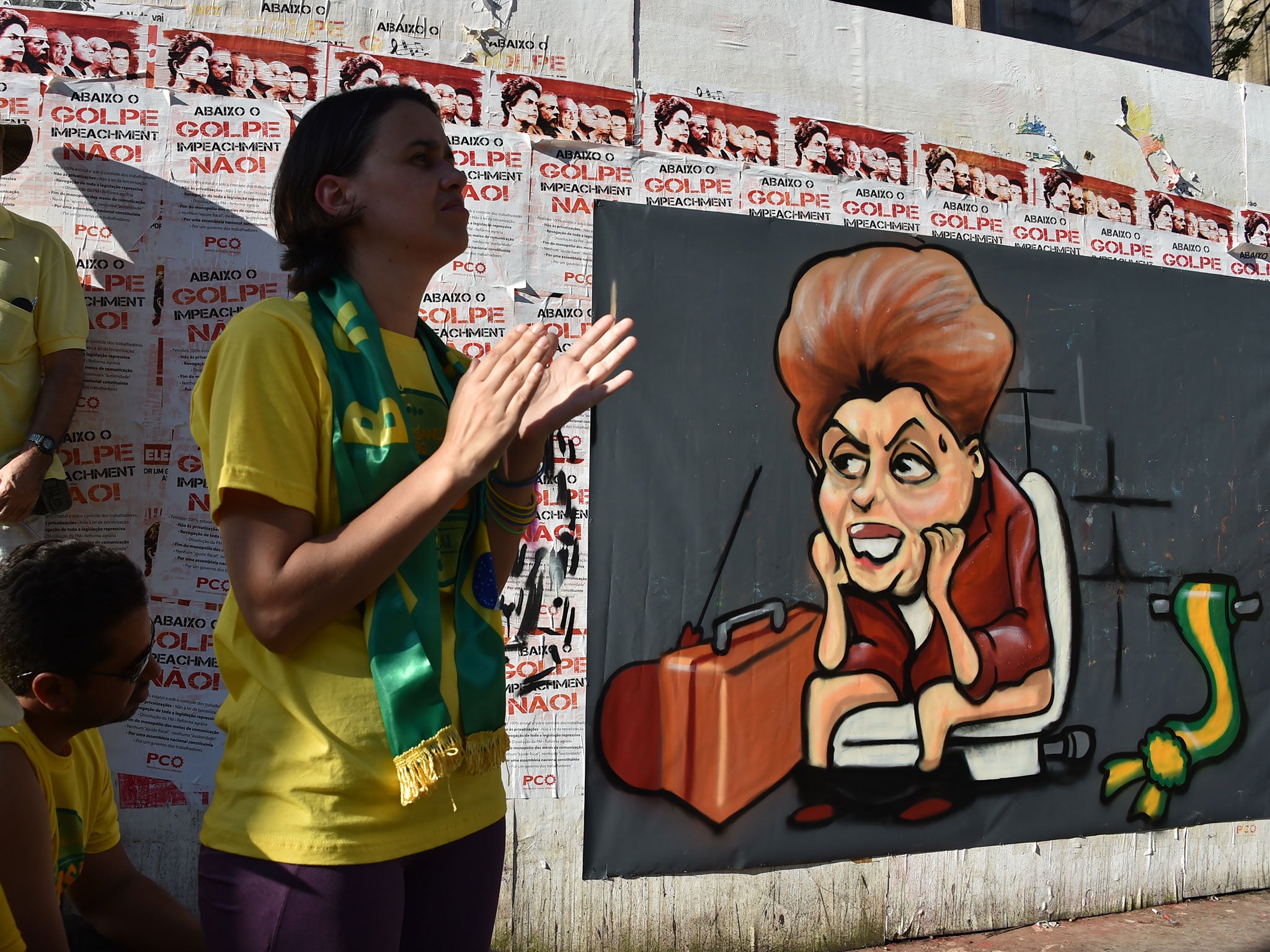President Dilma Rousseff of Brazil fights to stay in power as impeachment threat grows
Fresh upheaval threatens to cast shadow on 2016 Olympic Games

Your support helps us to tell the story
From reproductive rights to climate change to Big Tech, The Independent is on the ground when the story is developing. Whether it's investigating the financials of Elon Musk's pro-Trump PAC or producing our latest documentary, 'The A Word', which shines a light on the American women fighting for reproductive rights, we know how important it is to parse out the facts from the messaging.
At such a critical moment in US history, we need reporters on the ground. Your donation allows us to keep sending journalists to speak to both sides of the story.
The Independent is trusted by Americans across the entire political spectrum. And unlike many other quality news outlets, we choose not to lock Americans out of our reporting and analysis with paywalls. We believe quality journalism should be available to everyone, paid for by those who can afford it.
Your support makes all the difference.The political maneuverings in Brazil were at a fever pitch as President Dilma Rousseff searched for ways to remain in power after the lower house of Congress backed impeachment proceedings and her Vice President, Michel Temer, began preparing to take her place.
As Brazil entered a new phase of deeply damaging political upheaval, the options for Ms Rousseff appeared to be few. After the Chamber of Deputies in Brasilia on Sunday easily surpassed the two thirds mark required to move impeachment forward - voting 367 to 137 in favour - the issue now moves to the Senate, where her support is also dwindling.
There is nothing to indicate that she would go quietly, however. ”The president will not be disheartened and will not stop fighting,“ the Attorney General, Eduardo Cardozo, insisted on Monday. "If someone thinks she is going to bow down now, they are fooling themselves.”
Speaking in her office almost 24 hours after the vote was taken, Ms Rousseff made clear herself that she intended pushing back against all those who would remove her prematurely from office. "I have the energy, strength and courage to confront this injustice," she declared.
Yet, it would take only a straight majority in the 81-seat Senate to approve trying the president, who is accused of fiddling the nation’s books to cover up the real extent of its fiscal plight. Her trial, in the Senate chamber, would be expected to last 180 days or less. During that time, she would have to step aside and allow Vice President Temer to take her place.
It could be mid-May before the upper chamber takes that initial decision on whether or not to press forward. Local media outlets reported that as many as 41 senators have already concluded that they will abandon the president and support an impeachment trial, at the conclusion of which it would take a two thirds majority to remove her from office for good.
Speculation was rife that Ms Rousseff, whose second term should run until the end of 2018, might try to avoid the humiliation of impeachment by calling new elections. While such a step might not be unwelcome to many Brazilians there is no provision for it in the current constitution.
Aides to Ms Rousseff meanwhile indicated also that she would turn for help to the Supreme Federal Tribunal, Brazil’s highest court, to try to fight the impeachment campaign which she and her supporters have likened to a “coup”, orchestrated party, they allege, by Mr Temer, once the president's ally.
Just as the six-hour vote in the Chamber of Deputies on Sunday was marked by moments of histrionics and chaos, so Brazil, the largest economy in South America, seems destined for weeks and possibly months of even greater political turmoil, likely to be marked by increasing numbers of street protests and strikes, even as it prepares to host the Olympic Games.
Over recent weeks and months, Brazil has seen a groundswell of popular dissatisfaction with the government, fueled by the country’s rapidly deteriorating economic situation as well as by a daily drumbeat of stories connected to a sweeping bribery and corruption story involving a growing parade of top politicians - though not Ms Rousseff - and the state oil giant, Petrobras.
Yet, just as thousands were celebrating on the streets of Brasilia and elsewhere as news of Sunday’s impeachment vote filtered out, so many in the country were saddened by the plight of Ms Rousseff, whose Workers Party is still widely credited with lifting millions out of poverty with policies of inclusion and state largesse at the end of the last decade and the start of it this one.
Handpicked by former President Luiz Inacio Lula da Silva to succeed him, Ms Rousseff rode Brazil’s newfound economic prosperity when first elected in 2010. But by the time she faced re-election four years later, the sheen was off the economy thanks to a combination of falling commodity prices and rampant inefficiencies and corruption that had gone unaddressed.
As head of his own Brazilian Democratic Movement Party, Mr Temer, 75, enjoys broad support in Congress. However, he too is implicated in the fiscal shenanigans case dating back to when he was on Ms Rousseff’s re-election ticket and his popularity ratings nationally have recently plunged. But few doubt that he has been preparing for weeks to take the nation’s reins. “Now comes the hardest part,” he was quoted telling his aides once the Sunday vote had been taken.
Join our commenting forum
Join thought-provoking conversations, follow other Independent readers and see their replies
Comments